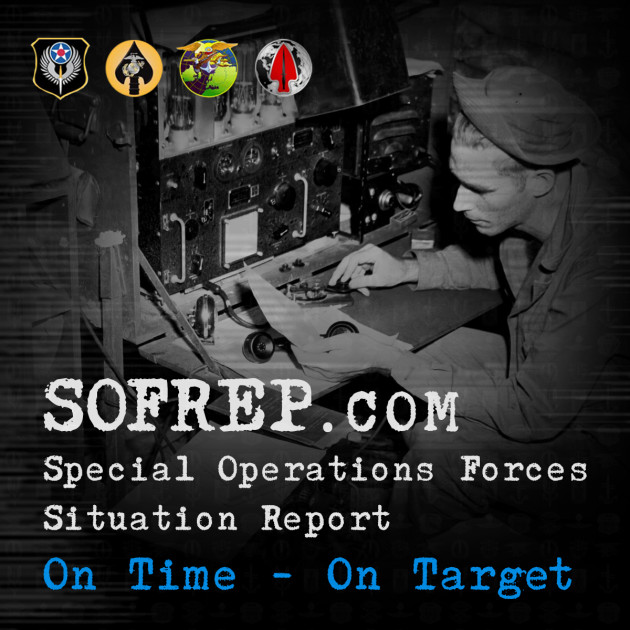There’s definitely no shame in not seeing any action. You served, you went where they sent you and did a great job. You’re a patriot, a veteran, you served our country. You passed some tests that most people can’t even imagine. Take pride and honor on that.
And your assessment of PTSD seems solid, well-thought, and it sounds like you have some good understanding of your experience and how you were affected. Drive on, continue to talk, and hold your head high!
– Charlie
//SOFREP Radio (geez, you guys love this show! Except maybe…)
Really enjoy the informative content of Sofrep. What happened to the podcast that had information, wit and feelings (and maybe a good beer or two)? Sorry guys, the current format is turning me off. Maybe if the new producer didn’t talk so much it might be ok. He mentions he has no military experience, and it shows. Some of his questions and comments make me cringe. Really miss the old format where I felt I was listening to a conversation among friends, with a lot of important information being shared. I will continue to read your articles but my earbuds will be plugged into Chairborne Commandos
– Aliduck55
Hey Aliduck55-
Give the new show a chance, nobody likes change but I can assure you that the same pipe hitting format is front and center. Ian will take a little while to get on his feet but we’ll still be issuing throat punches weekly, make no mistake about it.
-Brandon
//SOFREP Love
Charlie, really appreciate the write-back. standing by for the expanding radio channel on the actual website. what you and the team are doing is worth spending a lot of time keeping abreast of. I flip this site to everyone i think is interested, and a few who aren’t. thanks for standing guard over the flock… You dudes are like ralph the sheepdog in the wiley coyote cartoons. Quiet, composed, and one large mallet waiting to hammer down when required. be careful! thanks again.
– sh
Aw shucks, sh! We’re all blushing over here! Seriously, a lot of our writers are all about being the sheepdog, they understand their role and they write about it here to give that perspective.
And then there’s our good friend, Clint, who is all about being the sheepdog.
– Charlie
//Earning Your Place
Just wanted to pass this along for your use:
In September of 2005, on the first day of school, Martha Cothren, a History teacher at Robinson High School in Little Rock did something not to be forgotten.
On the first day of school, with the permission of the school superintendent, the principal and the building supervisor, she removed all of the desks in her classroom. When the first period kids entered the room they discovered that there were no desks. “Ms. Cothren, where are our desks?”
She replied, “You can’t have a desk until you tell me how you earn the right to sit at a desk.”
They thought, “Well, maybe it’s our grades.’ “No” she said. “Maybe it’s our behavior.” She told them, “No, it’s not even your behavior.”
And so, they came and went, the first period, second period, third period. Still no desks in the classroom. Kids called their parents to tell them what was happening and by early afternoon television news crews had started gathering at the school to report about this crazy teacher who had taken all the desks out of her room.
The final period of the day came and as the puzzled students found seats on the floor of the desk-less classroom. Martha Cothren said, “Throughout the day no one has been able to tell me just what he or she has done to earn the right to sit at the desks that are ordinarily found in this classroom. Now I am going to tell you.”
At this point, Martha Cothren went over to the door of her classroom and opened it. Twenty-seven (27) U.S. Veterans, all in uniform,walked into that classroom, each one carrying a school desk. The Vets began placing the school desks in rows, and then they would walk over and stand alongside the wall. By the time the last soldier had set the final desk in place those kids started to understand, perhaps for the first time in their lives, just how the right to sit at those desks had been earned.
Martha said, “You didn’t earn the right to sit at these desks. These heroes did it for you. They placed the desks here for you. They went halfway around the world, giving up their education and interrupting their careers and families so you could have the freedom you have. Now, it’s up to you to sit in them. It is your responsibility to learn, to be good students, to be good citizens. They paid the price so that you could have the freedom to
get an education. Don’t ever forget it.”
By the way, this is a true story. And this teacher was awarded Veterans of Foreign Wars Teacher of the Year for the State of Arkansas in 2006. She is the daughter of a WWII POW.
– Muskrat
Wow, just wow. Thank you for sharing that story, Muskrat!
– Charlie










COMMENTS